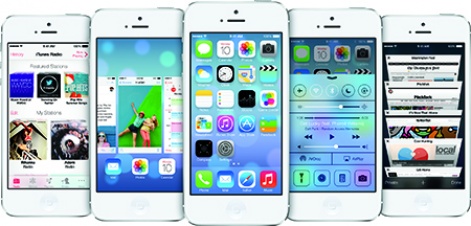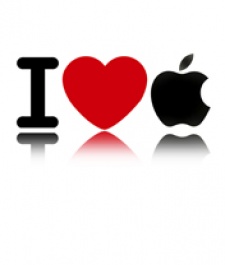During my early days at PocketGamer.biz, much of my time was spent tracking and reporting on Apple's various legal tussles around the globe many of which are still going on today.
Indeed, I may not have read Walter Isaacson's biography of Steve Jobs from start to finish, but based on the accounts of those that have it's fair to suggest Apple's departed CEO was an often angry man, keen to highlight when he believed the firm's rivals were riding on its coattails.
And, to a degree, I sympathise with that view.
The launch of iPhone and its associated operating system in 2007 undoubtedly had an effect on all the platforms that followed even those, like Android, that were in development at the time.
While you'd have a hard time suggesting any laws had been broken, iPhone's touchscreen-based set up undoubtedly resulted in scores of OEMs adopting the same approach as the Cupertino giant.
As things stand in 2013, BlackBerry stands as the only major platform to fully support anything other than touchscreen-focused devices.
Jobs, you could say, wanted to punish those cherry picking Apple's innovations, and he wanted to punish them with the law. But those same law courts are now comparatively quiet. Why?
The departed
My initial response is that, the spirit of innovation that led Apple down the path of developing the iPhone in the noughties of taking the risk required to build on the success of the original iPod has gone.
Apple's last big risk, in my view, was the iPad, and though it's easy to forget now the tablet notches up tens of millions of sales every quarter, it's one many sincerely believed would not pay off.
The fact that it did meant it was inevitably followed by Apple's customary lawsuits, as those chasing the US firm's lead in the newly formed tablet arena looked to (in the view of some) mirror iPad's form and functionality a little too closely.

Apple's original iPad was a genuine commercial risk
It's too simplistic to suggest that legal action always follows innovation when it comes to Apple (America's obsession with pinning down patents somewhat gets in the way), but there's definitely a correlation.
So, where has Apple's innovation gone? And, if we accept that it has taken a back seat in recent years, is that because Steve Jobs isn't driving the bus?
Reactionary
Sort of. During the iOS 7 unveiling and, indeed, the iPad mini reveal before it one phrase that was tossed around endlessly across social media was 'Jobs wouldn't have done that'.
Though he rarely spoke out on such issues, people have a keen grasp of what Jobs would or wouldn't have done with Apple in the years ahead had he still been around.
A smaller iPad and certified game controllers for iPhone would both appear to break the Jobs' mould, taking Apple into territory it simply wouldn't have taken on under his watch.
What's more, if rumours are to be believed, we can similarly expect apps and games to hit a redesigned Apple TV in the years ahead, equipped with the same kind of gamepads we'll soon encounter on iPhone.
This, too, is something we're told Jobs never wanted to do.
But there's also one thing that ties these three things together: none of them are innovations. They're all reactionary.
While iPhone, iPad and the App Store all (to varying degrees) broke new ground, smaller tablets, third-party game controllers and apps on your TV have all been done before.
In fact, the latter is so old hat now, that even rumours of an Apple TV console have subsided as late it's inevitability only matched by its sterility.
Follow the leader?
I'm perhaps being harsh here. Apple undoubtedly still leads the smartphone market, and its rivals even Samsung still chase its tail on many issues.
But, for those looking for an Apple infused with innovation, iOS 7 can only be viewed as something of a let down.
Having used the beta for a couple of weeks now, what strikes me is that it manages to be both the most significant change to iOS since the original iPhone launched and little more than a baby step forward, all at the same time.
Aside from the odd rudimentary change that are part and parcel of any OS update, iOS 7 is essentially little more than a new skin for an old OS. Where app icons were once shiny, they're now flat.
Where buttons once dominated the UI within those apps, we're now greeted by words.

iOS 7 offers little more than visual changes
The email client illustrates this to the greatest degree.
Almost every option, every function is located in the exact same place as it was before. The only difference is, the physical representation of buttons has been wiped clean, making for a much smarter looking UI.
But was any of this a surprise? Were people clamouring for yet shinier app icons, and Apple shook the ground beneath them by going the other way?
Not at all. A 'flatter' iOS had been whispered about ever since the death of Steve Jobs and, compared to the hundreds of mock ups that hit the web in the lead up to its reveal, iOS 7 was nowhere near as radical a change as even some of the most conservative clairvoyants had predicted.
Apple hasn't broken new ground with iOS 7. Instead, it's reacted slowly, and with much consideration, to calls from portions of its userbase. It hasn't led - it's followed.
Don't rock the boat
It may well be that Apple never surprises you again, instead taking on board the ceaseless suggestions from its aficionados and adopting the ones least likely to rock the boat.
Why? Because, whereas many saw Apple as the plucky upstart venturing into territory dominated by the likes of Nokia, BlackBerry and Motorola in 2007, it now leads the market and, as a result, has a lot more to lose.
It's telling that Apple's iOS 7 reveal has barely altered the outlook of most analysts.
For them, the biggest issue facing Apple today is less a redesign of the platform's UI, but rather working out a way for iPhone and co. to make a genuine impact in China, where Android's more open approach appears to have sewn things up.
If Apple can't move into new markets if it's proved that the firm's worldwide growth has plateaued then analysts and investors alike will start to worry. Flatter app icons? To be frank, they couldn't care less.
Which is why Apple's story over the course of the next few years will be less about adventure and innovation, and more about consolidating its position in the west while it tries to gain ground in the east.
This is something that would have happened with or without Jobs in charge, in truth, and a shift in strategy all companies that reach the pinnacle of their particular field have to deal with.
What's more, for developers, I think this is a good thing.
At a time when the rest of the games industry appears to be in flux the likelihood of a slow start for next-gen consoles from Sony and Microsoft high following Nintendo's inability to get Wii U off the ground, and a handheld market that's in decline by almost any measure some sense of stability could be a welcome change.
Innovation is still coming Ouya and the 'unconsoles' are evidence of that but likely less so from Apple, as it continues to cement its place at the top of the table. And that may be just what the entire industry needs.






















